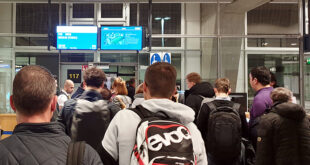The US and UK have issued directives to stop passengers from taking personal electronic devices in carry-on bags on flights from some countries in the Middle East and North Africa.
The US Department of Homeland Security (DHS) issued a directive on 21 March which applies to ten airports and nine airlines. Passengers flying to the US from these airports will only be able to take mobile phones into the aircraft cabin, other devices such as laptops and tablets must be put in checked baggage.
The airports on the DHS list are in Abu Dhabi, Amman, Cairo, Casablanca, Doha, Dubai, Istanbul, Kuwait, and Riyadh and Jeddah in Saudi Arabia.
The airlines affected are EgyptAir, Emirates, Etihad, Kuwait Airways, Qatar Airways, Royal Air Maroc, Royal Jordanian, Saudi Arabian Airlines and Turkish Airlines. No US carriers are affected as they don’t fly from any of the listed airports.
DHS said the airlines have until 24 March to apply the directive. The ban appears open-ended at present.
The British government also issued a similar order, banning larger electronic devices from aircraft cabins for flights to the UK from six Middle East and North African countries.
Countries affected by the UK ban are Egypt, Jordan, Lebanon, Saudi Arabia, Tunisia and Turkey. All airlines flying direct from these countries to the UK are affected.
UK airlines included in the directive are British Airways, easyJet, Jet2, Monarch, Thomas Cook and Thomson. Non-UK carriers affected are Atlas-Global, EgyptAir, Middle East Airlines, Pegasus, Royal Jordanian, Saudi Arabian Airlines, Tunisair and Turkish Airlines.
A major difference between the UK and US directives is the absence of the United Arab Emirates and Qatar from the British list. Major international airlines Emirates, Etihad and Qatar Airways will continue to fly into the UK unaffected by the new rules.
The UK gave no specific reason for the new directives, but the US said recent intelligence prompted their introduction.
Airwise
 THE AFRICAN COURIER. Reporting Africa and its Diaspora! The African Courier is an international magazine published in Germany to report on Africa and the Diaspora African experience. The first issue of the bimonthly magazine appeared on the newsstands on 15 February 1998. The African Courier is a communication forum for European-African political, economic and cultural exchanges, and a voice for Africa in Europe.
THE AFRICAN COURIER. Reporting Africa and its Diaspora! The African Courier is an international magazine published in Germany to report on Africa and the Diaspora African experience. The first issue of the bimonthly magazine appeared on the newsstands on 15 February 1998. The African Courier is a communication forum for European-African political, economic and cultural exchanges, and a voice for Africa in Europe.



























